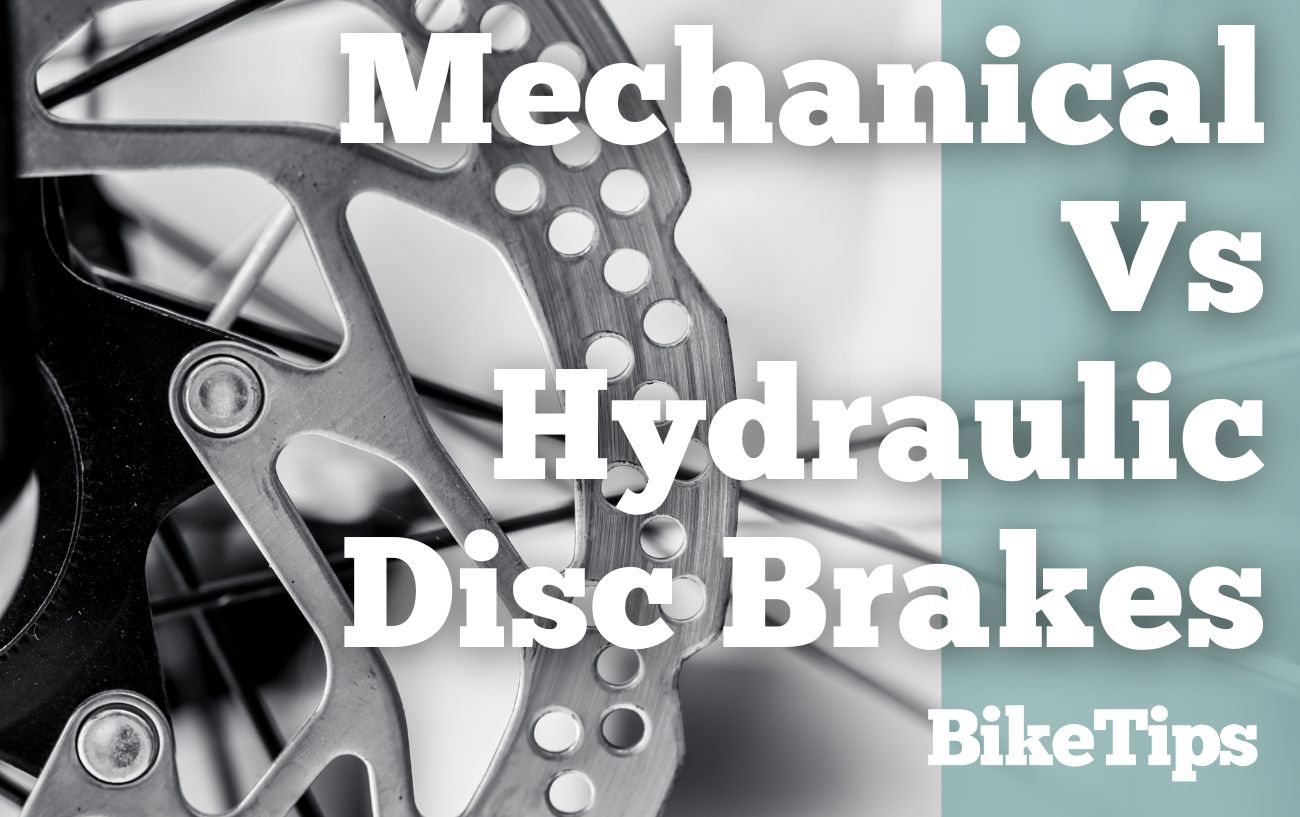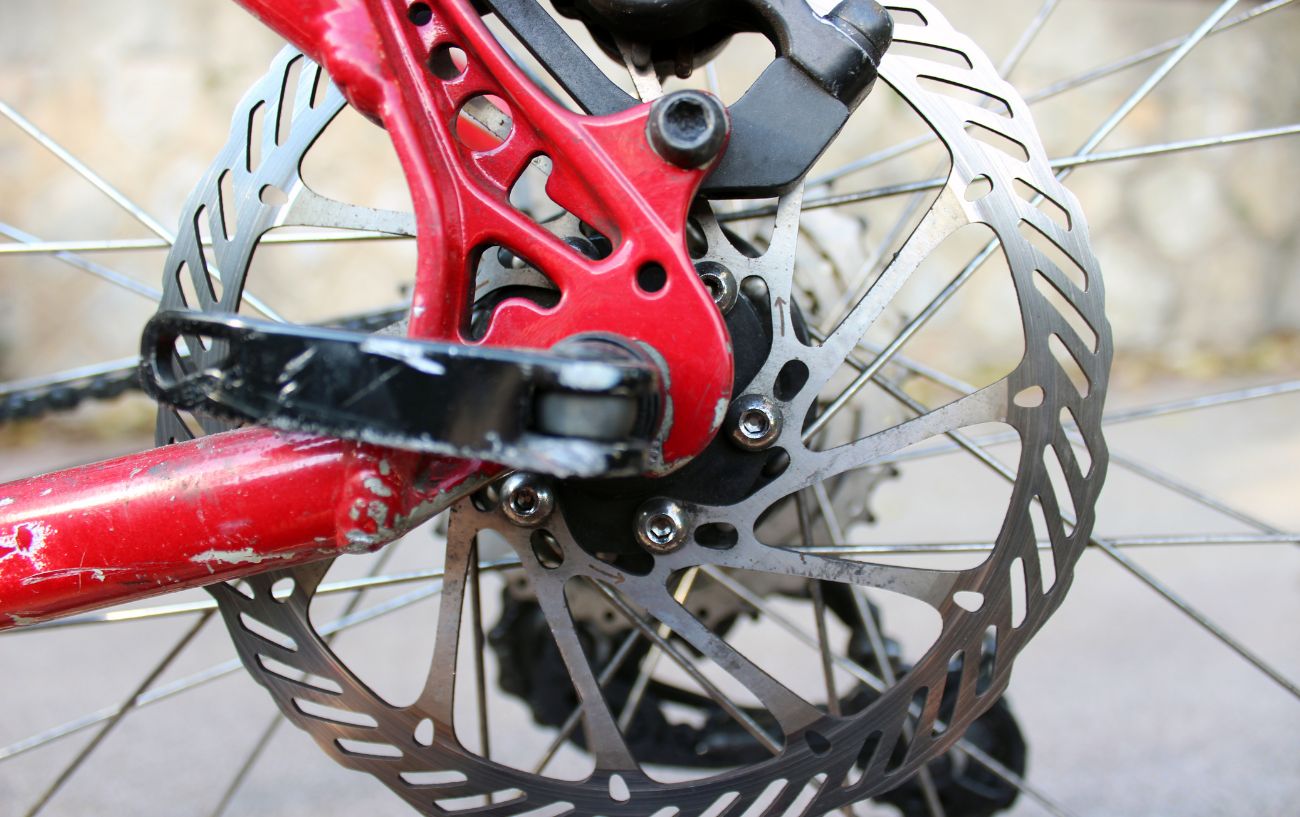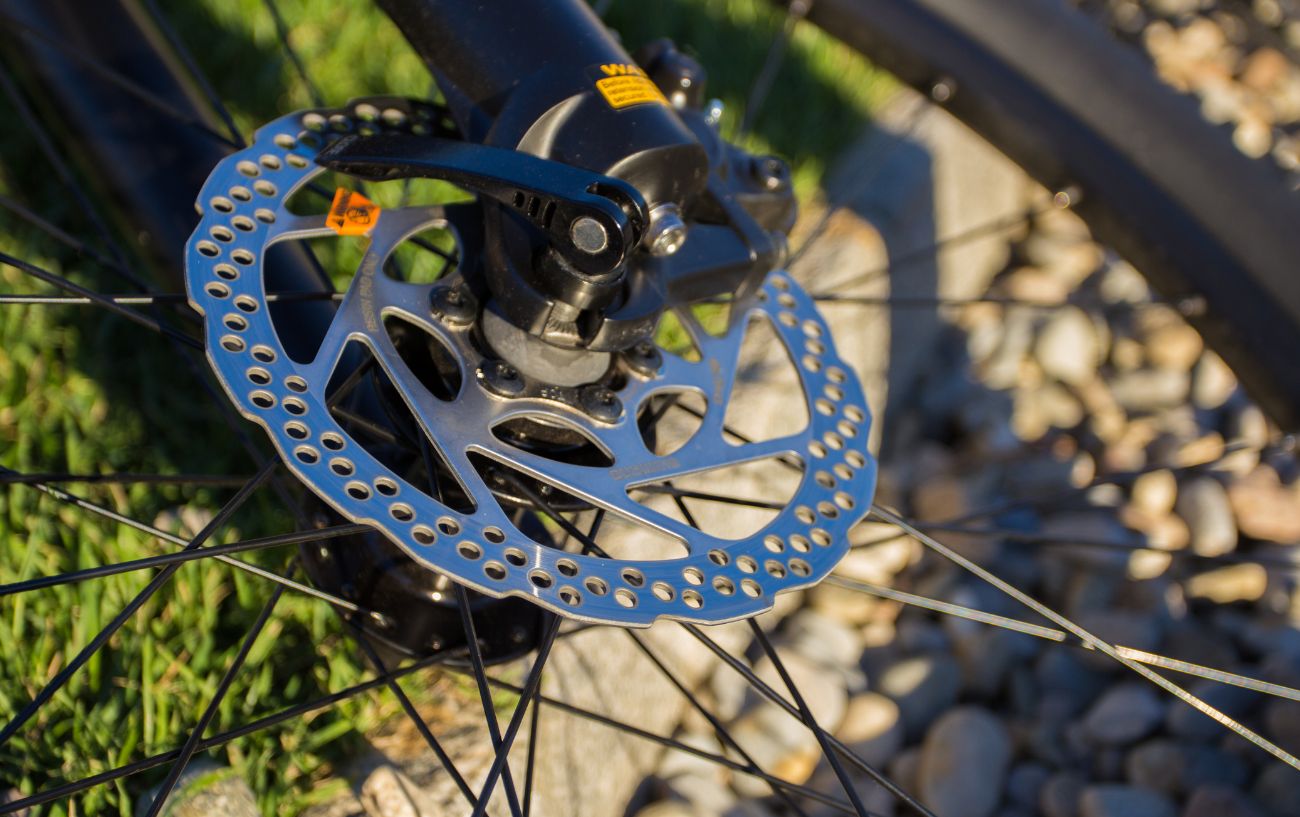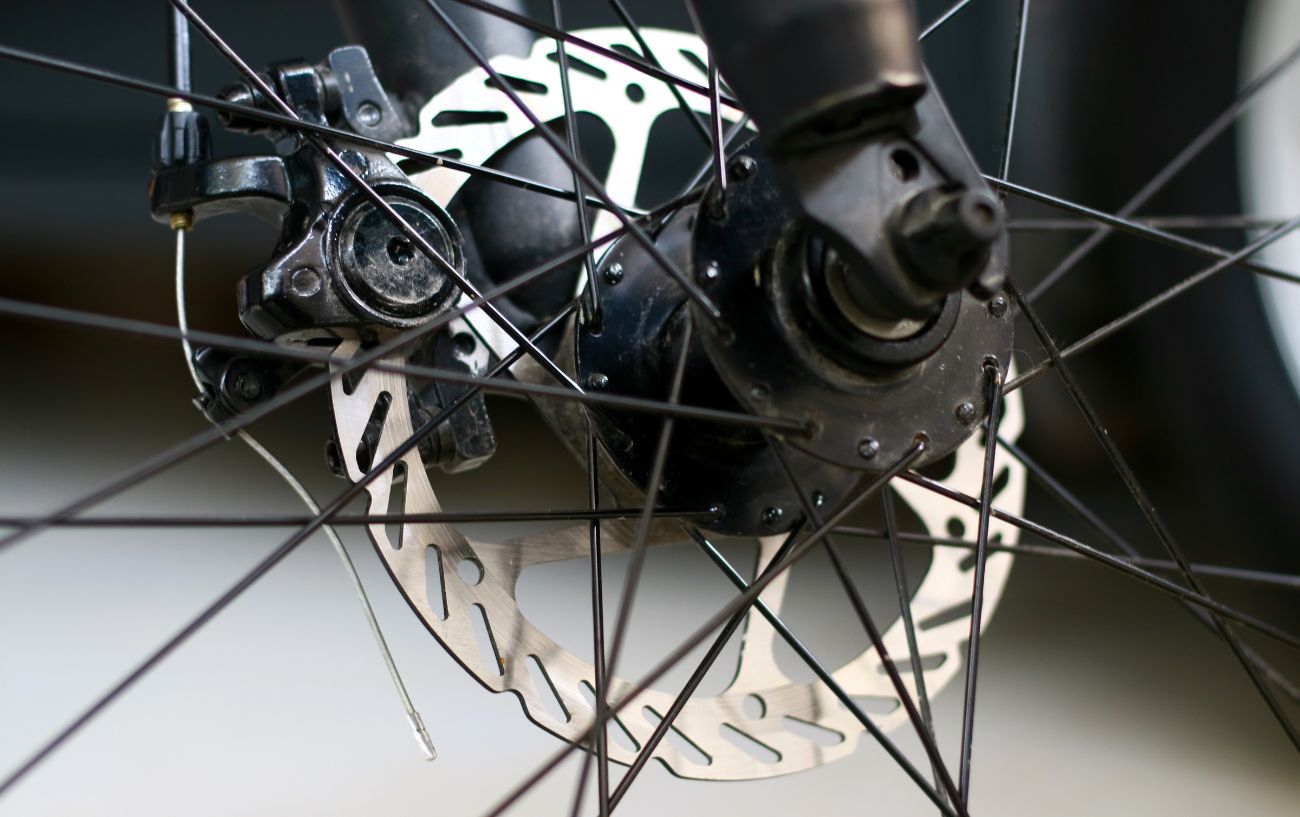Disc brakes have taken the cycling world by storm.
Once dominated by rim brakes, even road cyclists are now turning to the consistency and stopping power of disc brakes. Even some budget mountain bikes and mid-tier road bikes now come with disc brakes.
Not all disc brakes are the same, however.
One of the key variables is mechanical vs hydraulic disc brakes. They do the same thing, but differ in how the braking force gets transferred from the brake lever to the rotor.
You might wonder, “hydraulic vs mechanical disc brakes: does it really matter?”
In this article, we’ll be covering the following:
- A Quick Overview Of Disc Brakes
- Mechanical Disc Brakes
- Hydraulic Disc Brakes
- Mechanical Vs Hydraulic Disc Brakes
- Special Considerations
- Mechanical Vs Hydraulic Disc Brakes: Is One Better Than The Other?
Ready for the mechanical disc brakes vs hydraulic lowdown?
Let’s get into it!

A Quick Overview of disc brakes
Disc brakes were introduced as early as the 1950s. However, Shimano came out with the first recognizable hydraulic disc brake in the early ’70s.
It wasn’t until the late ’90s that the disc brake was genuinely ready for production bikes when the Hayes Mag disc brake was introduced.
Now that disc brakes have been perfected and refined for over 20 years, they are stock on most mountain bikes and quickly becoming the norm on road bikes too.
Unlike a rim brake, the disc brake uses a rotor mounted at the wheel’s hub as the braking surface. As a result, disc brakes offer superior stopping power to rim brakes, especially in wet or muddy conditions.

Mechanical disc brakes
Some disc brakes use a cable system to control the pistons. These are mechanical disc brakes.
A cable runs from your brake lever to your caliper. Pulling the brake lever uses a cable to engage a small lever at the caliper to pull the brake pads in, engaging the rotor.
Some benefits of mechanical disc brakes are that they are cheaper than their hydraulic counterparts and have less involved maintenance; you don’t have to bleed a brake cable.
You might wonder why anyone would bother with hydraulic systems. They do the same thing, and mechanical systems are a fraction of the cost.
Unfortunately, the truth is that mechanical disc brakes aren’t as efficient or responsive as hydraulic systems.
Cable systems are prone to wear and tear from various factors, such as friction and general strain from usage. Therefore, as the cable wears out, the performance of your brakes will start to suffer.
Additionally, as your brake pads wear down, you’ll have to adjust your cables to compensate.

Hydraulic Disc Brakes
Hydraulic disc brakes are seen as the high-performance end of the braking spectrum.
The way hydraulic disc brakes work is very similar to mechanical disc brakes. However, the critical difference is that there are no cables.
Instead, the lines are filled with hydraulic fluid.
By squeezing the brake lever, you depress the lever piston that pushes the fluid down the line to engage the pistons at the brake caliper. The pistons move the brake pads in to simultaneously engage the rotor on both sides.
Hydraulic disc brakes tend to have a more responsive and immediate braking feel. Without getting too deep into the physics of it, this is because fluid is incompressible and virtually frictionless.
When you squeeze the lever on a mechanical disc brake, some of the force from squeezing the lever is lost in the stretch of the cable and the friction in the cable housing.
Hydraulic disc brake fluid avoids these problems and transfers almost all the lever force directly to the pistons.
Two types of hydraulic fluid are used in disc brakes: mineral oil and DOT fluid. Using the correct type of brake fluid for your specific brakes is critical. Using the wrong fluid can result in poor performance or brake failure.
Both mineral oil and DOT fluid are heat resistant, performing equally well over long descents with a lot of braking. However, mineral oil will become too viscous to transfer power effectively in extreme cold, resulting in a “sluggish” brake feel.

Mechanical Vs Hydraulic Disc Brakes
So long as your bike is disc brake compatible – meaning it has a fork with caliper mounts and the wheel’s hub can mount a rotor – you can put either type of disc brake on your bike.
While both styles of disc brakes perform better than equivalent standards, there are some differences to consider when weighing up mechanical bs hydraulic disc brakes.
Mechanical disc brakes are less expensive than hydraulic ones. However, they are less efficient and more prone to wear and tear during use.
On the other hand, hydraulic disc brakes can be far more expensive but offer better performance and long-term usage.
When it’s time to service hydraulic disc brakes, you’ll have to face the dreaded bleeding process. Although hydraulic lines are sealed systems, the fluid degrades over time, and air bubbles can get into the line. This results in hydraulic brakes feeling “spongey.”

Bleeding the lines is a process that requires special tools and skill to add or remove fluid from the brake lines and get the air bubbles out.
This is a more technically involved and time-consuming process than adjusting brake cables, and not feasible to do mid-ride if you have a braking problem.
Many people opt for a mechanical disc brake for ease of maintenance alone!
Another consideration is braking efficiency. Hydraulic disc brake systems typically have actuating pistons on both brake pads, delivering force to both sides of the rotor equally and simultaneously.
Many mechanical brake systems will only use a single moving piston; the piston pushes the outside brake pad into the rotor, which is then pressed against a static inside brake pad.

Special considerations
Considering riding style in the discussion of mechanical vs hydraulic disc brakes is essential.
For example, though hydraulic disc brakes offer superior performance to mechanical disc brakes, is it really necessary for cross-country mountain bikers or enthusiast road cyclists? Possibly not.
However, for a downhill mountain biker, a four-piston hydraulic disc brake is almost non-negotiable.
Further, it’s important to consider the maintenance involved in the different styles of brakes. If you’re used to working on a mechanical rim brake, it’s not a massive move in technical ability to begin working on mechanical disc brakes.
On the other hand, maintaining hydraulic disc brakes is more complex, expensive, and time-consuming.

However, hydraulic brakes tend to require less upkeep overall than mechanical ones. Especially as your brake pads start to wear down, the hydraulic fluid allows the pistons to self-adjust, whereas mechanical disc brakes need to be manually adjusted.
For mountain bikers, getting new brakes can be as simple as taking off the old ones and popping on the new ones, mechanical or hydraulic, as the shift lever and brake lever are separate. But, unfortunately, this poses an issue for our drop-bar friends.
Hydraulic brakes are not compatible with mechanical levers. You’d need to get hydraulic-specific shift levers or a hybrid caliper like the TRP HY/RD.
Switching to an entirely hydraulic system is the best option if you take the hydraulic route, but that means more money and work to be done on your bike. Depending on your skills as a DIY bike mechanic, it could mean sending your bike off to the shop to have the work done professionally.
Using a hybrid caliper is a workaround, but they are not quite as effective as a full-on hydraulic or mechanical disc brake.

Mechanical Vs Hydraulic Disc Brakes: Is one better than the other?
All things equal, it’s clear that the hydraulic disc brake is superior to the mechanical disc brake.
But all things are not equal.
While hydraulic disc brakes have better stopping power, more consistency, and require less overall work, they are also more expensive and harder to work on.
On the other hand, mechanical disc brakes are cheaper and easier to work on but more prone to breaking down, have less power, and need more maintenance.
There’s no correct answer as to which brake is the best option for a specific rider, as several factors are in play. For example, an enthusiast-level rider who only gets out in fair weather on moderate terrain or tarmac can get away with a lower-grade mechanical brake.
However, it would be unwise for a competitive downhill mountain biker to skimp on cheaper mechanical disc brakes.
If you’ve got extra cash on hand or plan to do some serious off-road riding in variable conditions, go for hydraulic disc brakes.
If you’re a more casual rider or planning on keeping things in fair weather on the tarmac, mechanical disc brakes will suit you fine!



